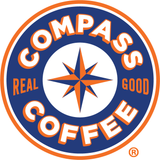At Compass Coffee, the mission is to make peoples’ days better.
Employees are trained on the four core values: Real Good Coffee, everybody cleans, Always Find a way, and Build Your City.
In this final segment of our 5-part series on building a stronger D.C. food economy, we’re going to focus on how Compass lives its values to build its city, and how that ties in with Union Kitchen’s core values of “insist on excellence” and “service comes first.”
Compass opened its first café in 2014, and hasn’t closed its doors for a single day since. In the years following, they’ve opened 11 more cafés, and even during the uncertainty of COVID, the roastery and the five other neighborhood cafés have stayed open as a safe haven and comfort for the regulars who live nearby, and want a safe place to get their daily fix.
The challenge with being open 365 days a year, though, is building the distribution network that can support it. While many restaurants have freezers and ovens, at Compass, everything is delivered fresh, and items like croissants, kolaches, and bagel bites are artisanally baked and delivered every morning to ensure that they meet the Real Good standard.
“We always want to make sure we’re serving our customers with pastries, breads, and snacks that are as good as the coffee,” says co-founder Michael Haft. “It’s also really important to us that we’re serving locally-made products from companies like Afirma water, Snacklins, Berg Bites, and Fresh Baguette, so that we can help build the D.C. food community around us.”
That commitment to serving artisanal, local-made products adds to the complexity of the Compass supply chain, but that’s where Union Kitchen comes in to help.
“D.C. would be a much more difficult place for Compass without Union Kitchen,” according to Compass product manager Chas Newman. “One of the exciting parts of developing our suite of café products is building a network of partners. If you find the right team, they will recognize that we all will succeed if we build a great product together.”
Union Kitchen, in working with over 650 food brands, caterers, and other food-based businesses, works with Compass to find the best products for its cafés and customers, and then works with the entrepreneurs creating those products to build their brands and develop their production methods to support the demand from larger customers like Compass.
“One of the exciting parts of being a Barista is that you get to try new products and elicit the feedback from customers on what they think,” notes Kuran Malhotra, Director of Corporate Development and former Barista, “It’s really exciting to tell a regular about a new type of muffin, or new flavor of kombucha that we’re selling, watch their eyes light up as they buy it and take that first bite or sip, and then see them come back day after day for more. It’s great for us, since we’re making our customers happy and making their days better, and it’s great for our supply partners, since their products are reaching a wider audience, and they can start to build a following of their own.”
With Union Kitchen delivering those products to Compass almost every day of the week, customers know they’re getting the highest quality, freshest ingredients in every bite. Customers often ask their baristas where the products or brands come from, and follow their favorites back to a Union Kitchen store, or sometimes to the makers themselves.
In serving Union Kitchen-made, local products, Compass is contributing to the ever-growing food ecosystem of the District. As we’ve explored through the past four parts of the series, Compass and Union Kitchen work together and play a pivotal role in developing new products and brands, serving the needs of D.C. customers, and building an interconnected network that supports D.C. food businesses in starting, growing, and scaling up to reach their goals.
“It’s really fulfilling,” says Malhotra. “Whether its at our Georgetown café, online, or at a Union Kitchen store, I always love seeing the brands we’ve partnered with, and it’s great to know that we played a small role in helping them grow and become super successful companies that are also elevating the D.C. food scene, and making D.C. into a well-known and respected hub for food innovation and exploration.”




